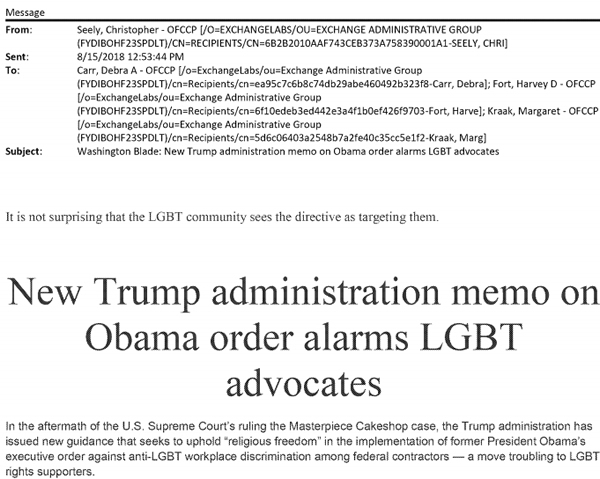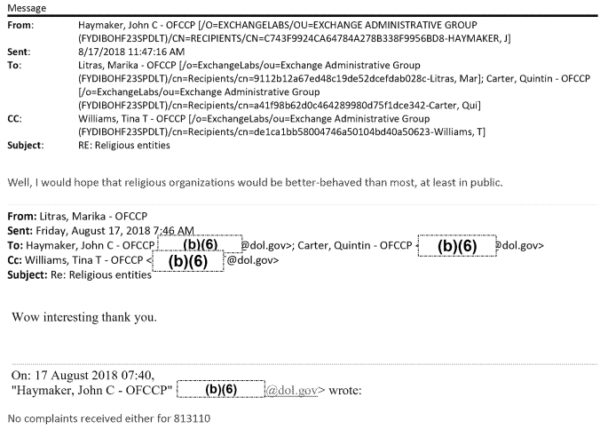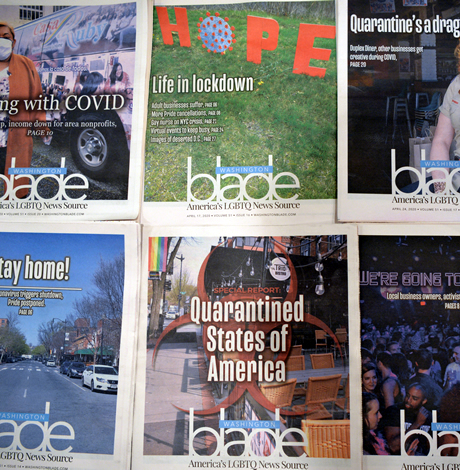National
Internal emails reveal questions, confusion on Trump religious freedom directive
Labor Department guidance seen to enable anti-LGBTQ discrimination

Emails obtained by the Washington Blade through a FOIA lawsuit reveal officials in the Trump administration’s Labor Department were mired in questions and confusion about a 2018 religious freedom directive to comply with the U.S. Supreme Court’s decision in the Masterpiece Cakeshop case.
Befuddlement and inquiries from business leaders, lawmakers, and media as well as progressive and conservative advocates alike reflect the criticism of the Labor Department’s religious freedom directive as a means to enable anti-LGBTQ discrimination.
A 2018 Blade story on the religious freedom directive, titled “New Trump administration memo on Obama order alarms LGBT advocates,” was circulated in an email chain among officials within the Office of Federal Contract Compliance. One of the top officials in that office, Christopher Seely, recognized the predictable impact the directive would have by writing in response to the Blade article: “It is not surprising that the LGBT community sees the directive as targeting them.”

The Masterpiece Cakeshop directive, as of now, is still in place, a Labor Department spokesperson confirmed for the Blade on Wednesday. However, the Biden administration has issued a proposed notice to rescind the rule implementing the legal requirements regarding the Equal Opportunity clause’s religious exemption.
The proposed rule, the Labor Department spokesperson said, is at the White House Office of Information & Regulatory Affairs pending review and will be published when that is concluded, which will lead to a public comment period and additional steps to make the rule final.
As reported by the Blade in August 2018, the Labor Department guidance purported to “incorporate recent developments in the law regarding religion-exercising organizations and individuals” with the enforcement of the executive order signed by former President Obama in 2014 barring federal contractors from engaging in discrimination against LGBTQ people in the workplace.
The imprint of former President Trump’s executive orders on religious freedom, which critics said were a means to allow federal grantees and contractors to engage in anti-LGBTQ discrimination, is also seen in the directive. It says that guidance has “similarly reminded the federal government of its duty to protect religious exercise — and not to impede it.”
All in all, the instructions seems aimed at allowing religiously affiliated non-profits to discriminate against LGBTQ workers despite Obama’s executive order prohibiting such bias in employment. Previously, religious non-profits, including religious schools and universities, were required to abide by the executive order and received no religious exemption.
The Washington Blade obtained the internal emails as a result of a lawsuit filed in September 2020 under the Freedom of Information Act with attorneys from the Reporters Committee for the Freedom of the Press, which sought communications within OFCCP to uncover information about the motivation behind the rule change in religious freedom. The Labor Department continues to produce emails to the Blade as a result of the ongoing litigation.
Labor Department officials appear to have anticipated the confusion and flurry of questions they would receive over the 2018 religious freedom directive. One email chain details discussions on a proposed email to stakeholders for when the guidance would be issued. The actual talking points are redacted in the email obtained by the Blade. Craig Leen, then director at OFFCP, concludes after the discussion: “[W]e are planning to proceed tomorrow.”
Among the emails obtained through this lawsuit were several from LGBTQ advocates questioning officials within the Labor Department on the 2018 Masterpiece Cakeshop directive, including representatives from the American Civil Liberties Union and the National Center for Transgender Equality and one separate FOIA request that appears to have come from the Center for American Progress.
One email chain discusses a FOIA request — identified as “Gruberg 865067,” which is presumably from Sharita Gruberg, vice president of LGBTQ research and communications at the Center for American Progress — seeking the number of requests made by federal contractors for a religious freedom exemption under Obama’s executive order. (Gruberg wasn’t available to comment by Blade deadline to confirm she was the one to make that FOIA request.)
A Labor Department official in the email chain describes the request as the “first FOIA request making inquiry as to whether or not a religious exemption has been requested since the directive was issued.” Another official responds, “I am not aware of one,” although it’s unclear from the email chain whether or not it was in response to the question about any federal contractors seeking a religious exemption or knowledge of any other FOIA requests on the directive.
But another email chain, one with officials preparing for a meeting with Democrats on the Senate Health, Education, Labor & Pensions Committee, reveals the absence of any complaints from religious freedom non-profits in complying with Obama’s executive order against anti-LGBTQ discrimination.
One Labor Department official asks for the number of reviews of religious organizations and the number of complaints received from religious organizations. A detailed chart from another official reveals a total of 11 reviews between fiscal years 2007 and 2016 with an average of about one per year. However, the official concludes in terms of complaints: “There were no complaint investigations.”
Marika Litras, an official within the Labor Department responds: “Very few which is what I suspected.” In response to a follow-up question from Litras on whether any complaints were received, the other official responds, “No complaints received either for 813110.” Litras replies: “Wow interesting thank you.”
Another top OFFCP official, John Haymaker, chimes in with a response uncharacteristically glib for government officials, but revealing of the basic understanding of the fairness of adhering to non-discrimination principles: “Well, I would hope that religious organizations would be better-behaved than most at least in public.”

The Labor Department’s internal responses to an ACLU inquiry in September 2018 are found in a separate email chain, which reveals a meeting scheduled for Sept. 17, 2018 between Ian Thompson, legislative director of the ACLU, and U.S. government officials on the religious freedom directive. Not much is revealed in the email chain other than talk about the right room to host the meeting.
Thompson, responding Wednesday to a question from the Blade on the email exchange, confirmed the meeting between the ACLU and Labor Department officials took place.
“As we repeatedly saw, the Trump administration had an agenda of using religion as a license to discriminate,” Thompson said. “We used this meeting to speak truth to power directly, raising our objections about how this directive would harm LGBTQ people and people from minority faith groups. Ultimately – as we knew they would – the Trump administration decided to move forward with this dangerous, discriminatory agenda.”
One email from Debra Carr, a Labor Department career official who had been serving director of policy for OFCCP, writing to colleagues about the meeting and discussing possible questions.”Who do you want to take a shot at drafting answers should they be needed?” Carr said. (The possible questions Carr writes, however, are redacted in the email obtained by the Blade.)
Another meeting between LGBTQ advocates and Trump administration officials is revealed to have taken place with the National Center for Transgender Equality taking the lead.
The job of drafting answers apparently went back to Carr. Litras, the other official at the Labor Department, responds: “Debra, can you take a stab at drafting brief responses?”
Carr passes the assignment to Christopher Seeley: “Hi Chris, take a shot at drafting responses to these.” Seeley, in turn, forwarded notice of the assignment to his supervisor, Harvey Fort: “This just came through as an assignment for me. I’m not sure the urgency, but it may eat into my week.” Fort replies: “Understood. That issue is very important to Craig and OFCCP.”
Seeley appears to have come with responses to the potential NCTE questions with a subsequent email to Carr: “Here are the responses I drafted.” (The actual email responses, however, are an attachment and not included in the email dump obtained by the Blade.)
The meeting between Labor Department offices and OFCPP, however, apparently did little if anything to allay the concerns of the transgender group. A subsequent chain includes an email from Ma’ayan Anafi, then policy counsel for the National Center for Transgender Equality, who says she has attached a letter from groups with “grave concerns” about the religious freedom directive.
“Please find attached a letter on behalf of 42 organizations expressing our grave concerns regarding Directive 2018-03, issued to OFCCP staff on August 10,” Anafi writes.
A proposed response to the letter is included in the email chain, although the content of the letter is redacted in the version obtained by Blade. Leen asks colleagues for review, which he said will be sent on OFCCP letterhead and sent to the Office of the Executive Secretariat. NCTE wasn’t immediately available to comment Wednesday on the whether it had obtained the directive and its reaction.
There were also inquiries from social conservative groups, including the Texas-based First Liberty Institute and the House Values Action Team, a group of conservative lawmakers led by Rep. Vicky Hartzler (R-Mo.).
One email from Katie Doherty, executive director of the Values Action Team, suggests possible dates and times for a meeting with Labor Department officials and invites them to brief lawmakers at an upcoming coalition meeting for the purpose of “providing a brief overview of DOL’s changes.”
The meeting appears to have taken place. In a subsequent exchange, a Labor Department official talks about a proposal from social conservatives “regarding their recommendations for implementing Directive 2018-03” as proposed in an email from Mike Berry, deputy general counsel at the First Liberty Institute.
“It was great to meet you and Mr. Leen last week at the House VAT meeting,” Berry writes. “Per our post-meeting discussion, I am sending you a document outlining our proposals for implementing Directive 2018-03. We would be happy to discuss this further, whether with representatives from OFCCP, or via a listening session, etc.”
Leen, in a subsequent email, affirms receipt of the recommendations, but asks his colleague to remind the First Liberty Institute he has little jurisdiction to implement them.
“Please thank Mr. Berry for providing this information and let him know we will review it,” Leen writes. “I am available to meet with him to discuss the directive if he would like. As for the rulemaking process, please let him know we are unable to comment on that, and he will have the opportunity to submit comments in response to a proposed rule.”
Other emails circulated questions on the religious freedom directive from business community groups, including the New York-based Equality Institute and the Center for Workplace Compliance. In addition to the Blade, questions from Buzzfeed are discussed, as well as an article from Bloomberg and a joint letter from Jewish religious leaders objecting to the directive.
Jennifer Pizer, senior counsel and director of strategic initiatives for the LGBTQ group Lamdba Legal, said Wednesday in response to a Blade inquiry on internal talk at the Labor Department the guidance was “just one of the slew of outrageous rule changes the Trump administration issued to greenlight harmful, legally inexcusable religion-based discrimination.
“Such discrimination continues to be widespread in employment as well as in medical and social services delivery, education, and other areas of public life for LGBTQ people and many others,” Pizer said. “And it hits hardest those who have limited options.”
Federal Government
UPenn erases Lia Thomas’s records as part of settlement with White House
University agreed to ban trans women from women’s sports teams

In a settlement with the Trump-Vance administration announced on Tuesday, the University of Pennsylvania will ban transgender athletes from competing and erase swimming records set by transgender former student Lia Thomas.
The U.S. Department of Education’s Office for Civil Rights found the university in violation of Title IX, the federal rights law barring sex based discrimination in educational institutions, by “permitting males to compete in women’s intercollegiate athletics and to occupy women-only intimate facilities.”
The statement issued by University of Pennsylvania President J. Larry Jameson highlighted how the law’s interpretation was changed substantially under President Donald Trump’s second term.
“The Department of Education OCR investigated the participation of one transgender athlete on the women’s swimming team three years ago, during the 2021-2022 swim season,” he wrote. “At that time, Penn was in compliance with NCAA eligibility rules and Title IX as then interpreted.”
Jameson continued, “Penn has always followed — and continues to follow — Title IX and the applicable policy of the NCAA regarding transgender athletes. NCAA eligibility rules changed in February 2025 with Executive Orders 14168 and 14201 and Penn will continue to adhere to these new rules.”
Writing that “we acknowledge that some student-athletes were disadvantaged by these rules” in place while Thomas was allowed to compete, the university president added, “We recognize this and will apologize to those who experienced a competitive disadvantage or experienced anxiety because of the policies in effect at the time.”
“Today’s resolution agreement with UPenn is yet another example of the Trump effect in action,” Education Secretary Linda McMahon said in a statement. “Thanks to the leadership of President Trump, UPenn has agreed both to apologize for its past Title IX violations and to ensure that women’s sports are protected at the university for future generations of female athletes.”
Under former President Joe Biden, the department’s Office of Civil Rights sought to protect against anti-LGBTQ discrimination in education, bringing investigations and enforcement actions in cases where school officials might, for example, require trans students to use restrooms and facilities consistent with their birth sex or fail to respond to peer harassment over their gender identity.
Much of the legal reasoning behind the Biden-Harris administration’s positions extended from the 2020 U.S. Supreme Court case Bostock v. Clayton County, which found that sex-based discrimination includes that which is based on sexual orientation or gender identity under Title VII rules covering employment practices.
The Trump-Vance administration last week put the state of California on notice that its trans athlete policies were, or once were, in violation of Title IX, which comes amid the ongoing battle with Maine over the same issue.
New York
Two teens shot steps from Stonewall Inn after NYC Pride parade
One of the victims remains in critical condition

On Sunday night, following the annual NYC Pride March, two girls were shot in Sheridan Square, feet away from the historic Stonewall Inn.
According to an NYPD report, the two girls, aged 16 and 17, were shot around 10:15 p.m. as Pride festivities began to wind down. The 16-year-old was struck in the head and, according to police sources, is said to be in critical condition, while the 17-year-old was said to be in stable condition.
The Washington Blade confirmed with the NYPD the details from the police reports and learned no arrests had been made as of noon Monday.
The shooting took place in the Greenwich Village neighborhood of Manhattan, mere feet away from the most famous gay bar in the city — if not the world — the Stonewall Inn. Earlier that day, hundreds of thousands of people marched down Christopher Street to celebrate 55 years of LGBTQ people standing up for their rights.
In June 1969, after police raided the Stonewall Inn, members of the LGBTQ community pushed back, sparking what became known as the Stonewall riots. Over the course of two days, LGBTQ New Yorkers protested the discriminatory policing of queer spaces across the city and mobilized to speak out — and throw bottles if need be — at officers attempting to suppress their existence.
The following year, LGBTQ people returned to the Stonewall Inn and marched through the same streets where queer New Yorkers had been arrested, marking the first “Gay Pride March” in history and declaring that LGBTQ people were not going anywhere.
New York State Assemblywoman Deborah Glick, whose district includes Greenwich Village, took to social media to comment on the shooting.
“After decades of peaceful Pride celebrations — this year gun fire and two people shot near the Stonewall Inn is a reminder that gun violence is everywhere,” the lesbian lawmaker said on X. “Guns are a problem despite the NRA BS.”
New York
Zohran Mamdani participates in NYC Pride parade
Mayoral candidate has detailed LGBTQ rights platform

Zohran Mamdani, the candidate for mayor of New York City who pulled a surprise victory in the primary contest last week, walked in the city’s Pride parade on Sunday.
The Democratic Socialist and New York State Assembly member published photos on social media with New York Attorney General Letitia James, telling followers it was “a joy to march in NYC Pride with the people’s champ” and to “see so many friends on this gorgeous day.”
“Happy Pride NYC,” he wrote, adding a rainbow emoji.
Mamdani’s platform includes a detailed plan for LGBTQ people who “across the United States are facing an increasingly hostile political environment.”
His campaign website explains: “New York City must be a refuge for LGBTQIA+ people, but private institutions in our own city have already started capitulating to Trump’s assault on trans rights.
“Meanwhile, the cost of living crisis confronting working class people across the city hits the LGBTQIA+ community particularly hard, with higher rates of unemployment and homelessness than the rest of the city.”
“The Mamdani administration will protect LGBTQIA+ New Yorkers by expanding and protecting gender-affirming care citywide, making NYC an LGBTQIA+ sanctuary city, and creating the Office of LGBTQIA+ Affairs.”


















